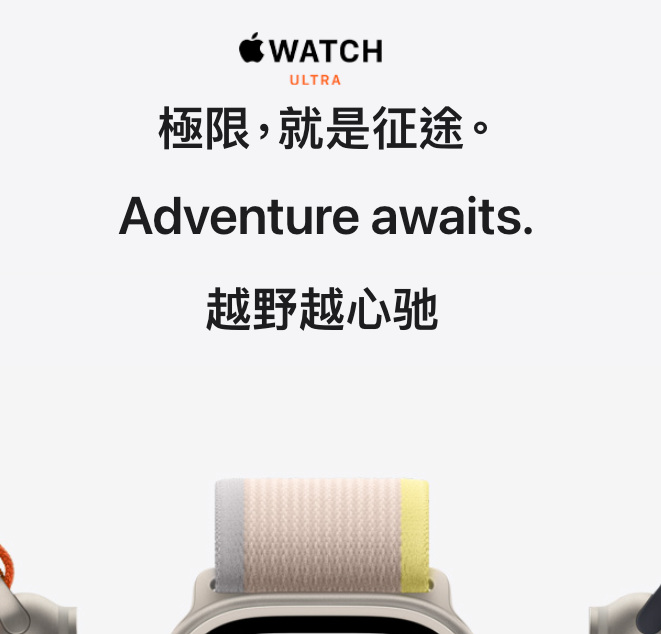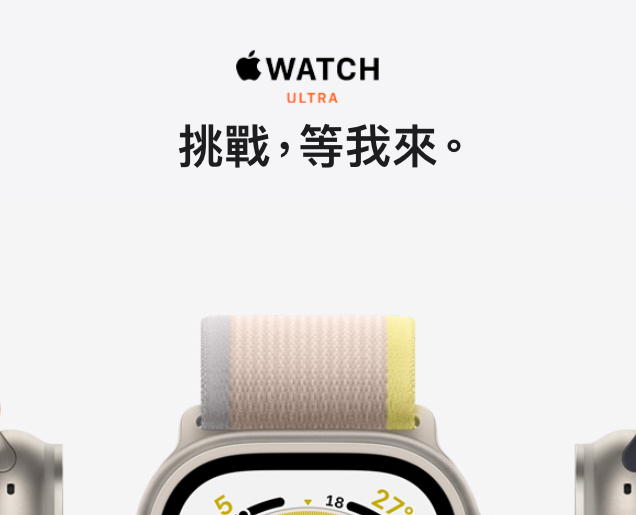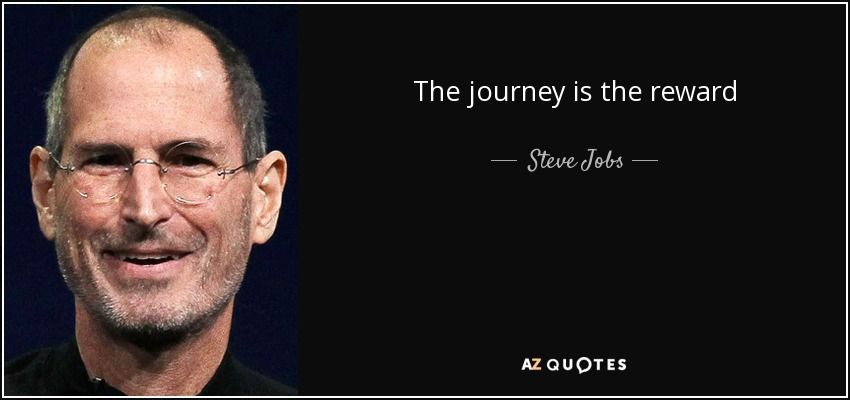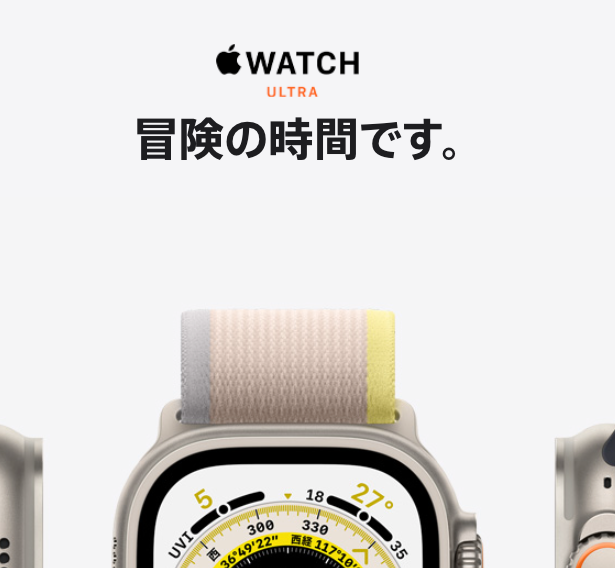
曾任某電動車系統公司行銷長。主業是數位行銷與媒體管理顧問。長年的寫作者、譯者、編輯、重機騎士、雪茄和艾雷島威士忌愛好者。 我也是養兩隻貓的犬派潛水員、健身教練、書法家。 關於我/https://fred.mba
Wear your watch and go on an adventure? Four versions of Apple's new watch slogan

This article was originally published in the "Uncle F's Hardcore Marketing School" e-newsletter, welcome to subscribe.
The slogan "Adventure awaits" on the English version of the Apple Watch Ultra watch page, if it is literally translated, is:
(Put this watch on,) Adventure awaits you.
Although the Taiwanese version of the translation "The limit is the journey" has a small supertranslation, it is one of the best Chinese slogan translations I have seen in recent years (translators please accept me). As for the Chinese version of "Off-Road Yue Xin Chi", although it is also very clever, the realm is not as high as the Taiwan version.
Chinese version
Let's talk about the Chinese version of "Off-Road Yue Xin Chi" first. According to my interpretation, three stems are used in this version:
- "Off-road": (more and more) off-road, which also brings the demand for outdoor sports functions of Apple Watch Ultra;
- The catchphrase "The more (at this time, "Yue") is the more beautiful at night": may be from the song of the same name by Hong Kong female singer Karen Mok in 2000; there may be an earlier source, if there is any, please let readers know;
- The idiom " heart swaying ": to describe something that is loved, and then indulged in it.
So in terms of the textual background, this is also a good slogan, but it is somewhat different from the original meaning of the English version.
Hong Kong version

As for the Hong Kong version of "Challenge, wait for me", it is closer to the literal translation, but the main word "exploration" of "waiting" is changed to "user".
The meaning of "I" here is a bit ambiguous, and the whole sentence can be expanded to read:
- "These challenges (adventures), watch (wait) I'll conquer!";
- "These challenges (explorations) are waiting for me to conquer." At this time, the subject becomes "exploration" again.
The semantics of the two are roughly the same, except that they use a word game that deliberately blurs the subject; in fact, if it is changed to the more common appeal tone "challenge, waiting for you", it also makes sense.
In the face of a less well-written version, this kind of "makes sense" is an advantage, because it gives the audience more room for imagination; but when it comes to a better version, the ambiguous tone will make the momentum become a little weaker.
However, the Hong Kong version is basically still within the framework of the original text, and it also has some ingenuity, which is also a good way of writing.
Taiwan version
The Taiwan version is "The limit is the journey" that I appreciate more. Part of what I appreciate is that:
- Its moderate overtranslation, plus the "limits" that the original text does not have, makes the audience's imagination of "sports" go beyond the framework of the original text;
- The following "journey" subtly replaces the word "adventure", which is very troublesome to translate, and echoes with "limit". As for why "adventure" is troublesome, there will be an explanation later.
When I saw the translation of "the limit is the journey", what immediately came to my mind was one of Apple's most famous corporate slogans of the 1980s, "The Journey is the Reward":

This quote is said to come from Steve Jobs himself, and is the title of one of the later Jobs biographical books . In addition, it is also one of the two most difficult slogans for Apple to accurately translate into Chinese (the other is "The Power to be Your Best").
If it is translated literally, it means "the process is the reward"; if it is translated in the style of this slogan, it is "the journey is the achievement".
So you should be able to understand why I immediately think of this old slogan and why I selfishly love this Taiwanese translation of "The limit is the journey". If the old and new sentences are linked together, there will even be some new meanings:
The limit is the journey; (however) the journey is the achievement.
"The process of pursuing the limit must be difficult, but it is the process that every aspiring person must go through; although everyone may not be able to reach the end, as long as they embark on this road and get experience from the road, no matter whether they succeed or fail, they will It's your personal achievement."
Probably means this. Do you agree?
Control group: Japanese version
As usual, we still invite Japanese counterparts with a high level of copywriting to provide reference works:

The Japanese translation is "険の时间です", which means "it's time for adventure" which should be easy to understand.
Compared with several Chinese versions, the Japanese version is much more bland (it has been the case in recent years), which is a very direct appeal "(wear this watch) to take an adventure!".
"Time です" is an idiom in Japanese, which is often used to remind others that "it's time to eat", "it's time to go", "it's time to do XX things"; so it's quite a bit to remind the audience that "it's time to take risks" Straightforward extension.
By the way: "Adventure" is troublesome
So what is Adventure? How to translate correctly?
Usually we translate this word as "adventure" or "adventure", but most of the time in our lives there is no "dangerous" element in it; even in extreme sports, the chance of encountering "dangerous" is very high. not tall. So whether it is "adventure" or "adventure", there is a little bit of hypertranslation.
Perhaps hundreds of years ago, there were still many unexplored places in the world, or things that no one had tried yet, so if you do it, you have to risk your life; but in today's world, such opportunities are not too great. Much, what we call "adventure" most of the time is an exaggeration.
So when I am translating, as long as I encounter this word (for example, describing entrepreneurship as a kind of "advanture"), I will feel very troublesome; I often try to use "exploration", "experiment", "brave attempt" and so on. Replace it with words, instead of directly translating it into "adventure/exploration".
Because of this, this time the Taiwan version of the slogan translated it into "journey" in a specific context, which I think is a very wise choice; the Hong Kong version translated it into "challenge", which is slightly inferior, but it is also worth seeing. There is no same thoughtful conversion.
As for the Chinese version, it completely ignores this point, and the Japanese version even completely follows the usual habit of literal translation, which naturally falls behind.
Epilogue
The few translated versions by Apple this time have roughly continued my observations and comments in the past two or three years (I have tried my best to use a neutral language point of view to analyze, rather than just use my Taiwanese background as a standard): most of the time the Taiwanese version It is more free and excellent, and it is more courageous to change out of the English frame; the Chinese version tends to ignore the original meaning of English, but uses the translator's personal writing skills to play.
The Hong Kong version tends to be short, trying to use fewer words to stimulate the reader's imagination through techniques such as metaphors and puns. The Japanese version is more "dry", trying to express the meaning of English in a conservative translation style, so the result is relatively monotonous compared to the Chinese versions.
After reading the above analysis, you should also know the ranking of these versions in my heart. Maybe your favorite version is different from mine, and that's fine; as long as you feel your favorite version captures the spirit of the product and motivates users to buy it, it's a success.
Like my work?
Don't forget to support or like, so I know you are with me..

傅瑞德的硬派行銷塾

歡迎來到「傅瑞德的硬派行銷塾」。我從事寫作和翻譯逾30年。曾擔任企業行銷長、雜誌社長、開了語言行銷服務公司、寫過很多中英文文案。個人簡介請參閱 https://fred.mba 。
Comment…